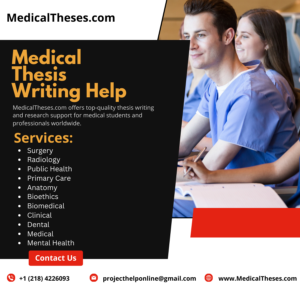Hire Someone To Write My Medical Thesis
Writing an exceptional medical thesis is an integral part of becoming healthcare professionals. A solid thesis contributes to medical literature, influences future research and practice, and showcases analytical thinking skills.
Medical dissertation writing services provide comprehensive support to students throughout all stages of their academic journey, from choosing an appropriate topic and conducting comprehensive research, through to writing their thesis.
The Gold Standard in Medical Communications
We offer the key to success in this challenging field. With our proven methods, time-
tested experience, and a comprehensive range of services tailored to your unique
needs, we are a trusted name in MedicalTheses. Find out how we can help today.
Cap Prescription Costs
MedicalTheses offers expert insights on capping prescription costs for optimal healthcare affordability.
Solve Modern Challenges
Empowering researchers with innovative tools and expert guidance to tackle complex medical thesis challenges efficiently.
Congress Endorses Plan
Congress Endorses Plan to Cap Prescription Costs, Ensuring Affordable Medications for All.
Open Access Support
MedicalTheses champions Open Access Support for unrestricted, high-quality medical research.
Choosing a suitable topic
Choose an appropriate topic when writing a medical thesis is key to its success. Make sure your topic has enough research scope to demonstrate your knowledge on the subject matter while taking into account recent trends and developments in medical science.
Finding an appropriate topic should start by considering your interests and expertise, Anatomy then selecting an area of study that truly resonates with you and aligns with your career goals. Assess its feasibility by checking if all necessary resources can be made available for conducting research on it.
Once you’ve chosen your topic, the next step in planning and writing your thesis should be creating an outline for your research and thesis writing process. Make sure your outline includes an introduction, literature review, methodology, results & discussion and conclusion sections; this will allow you to stay organized as well as serve as a roadmap for further exploration & writing efforts.
Developing a thesis statement
Establishing a thesis statement for your medical thesis writing project is an integral step in its creation. It sets the scene and guides readers, while helping narrow your focus and clarify your arguments. However, Anatomy and Physiology the development process of this statement may continue as you become more acquainted with its implications and your topic of choice.
To create an outstanding medical thesis, the first step should be selecting an ideal topic and conducting extensive research. After conducting this initial phase of investigation, familiarizing yourself with current literature and attending conferences to broaden your knowledge in this subject matter is also beneficial. Furthermore, effective organizational strategies should be put in place in order to streamline this research process such as note-taking tools or citation management software, setting achievable milestones, or working alongside subject matter experts in order to enhance both your research skills as well as writing abilities.
Conducting research
An MD thesis is an integral component of the MD program and serves as evidence of your independent research and analysis skills. Your medical thesis should demonstrate your grasp of healthcare issues, Bioethics offer new solutions or insights, while simultaneously illustrating your ability to critically appraise research and identify knowledge gaps.
It is key when choosing a medical thesis writing service to select one with an excellent reputation and deep knowledge of your individual requirements. Check testimonials, reviews and samples of previous work to verify quality services provided. Furthermore, an exceptional company will offer personalized assistance while meeting deadlines and guidelines with ease.
As part of your writing process, it’s crucial that you develop a system for organizing research materials. This could involve anything from note-taking tools or citation management software to working closely with subject matter experts on improving quality research projects and building stronger arguments.
Writing the thesis
Writing a medical thesis may seem daunting, but with proper guidance and support it can be accomplished successfully. A good thesis should tackle an actual issue within its field and contribute to furthering medical science; also demonstrate an in-depth knowledge of existing research theories; Biomedical use reliable sources such as academic databases or medical textbooks as sources for your information;
When selecting a medical thesis service, search for one with an excellent track record and reputation. They should offer tailored assistance that meets your exact requirements. Furthermore, it must respond swiftly and efficiently to feedback; finally they should be affordable; avoid services offering unrealistic promises of guaranteed high grades as this should be taken as a red flag. The top medical thesis writing services provide quality work at a reasonable price while protecting privacy by not sharing personal details with third parties.
The Prescription for Quality
Our team of seasoned professionals, backed by 18+ years of industry expertise, delivers results that speak for themselves
– exceptional quality, timely publications, and unwavering commitment to ethical standards.

Project Management
Experience the benefits of our expert project management, seamless coordination, timely execution, and the successful realisation of your medical communication objectives.

Seasoned Medical Writers
Entrust your project to our skilled and experienced medical writers, who possess the ability to transform complex scientific concepts into engaging, clear, and compelling content, unlocking the true potential of your data.

Uncompromising Ethical Standards
Rest assured in the knowledge that our steadfast commitment to ethical standards and Good Publication Practice (GPP) serves as the foundation of our MedicalTheses agency, ensuring your projects are conducted with integrity and credibility, every step of the way.
Medical Thesis Writing Help
Writing a medical thesis can be an arduous undertaking, requiring extensive research and diligent activity. Furthermore, Cancer its content must meet specific guidelines set by regulatory bodies.
Select a medical dissertation topic that excites and intrigues you, while adding new insights to the field of study.

Choosing a Topic
Selecting a topic for your medical thesis research is a pivotal part of the process, Clinical setting the direction for its rest and helping you find ways to contribute to medical research more broadly.
Think carefully about which areas of medicine intrigue you most and then select a topic which can be studied using available resources and is relevant to current medical challenges.
Consideration should also be given to the feasibility of your research project and whether it can be completed within its allocated timeline. In addition, consider how your study will impact patients and the medical community – for instance will your findings result in changes to healthcare policies or technologies? Moreover, ensure your topic selection adheres to ethical principles as your research should always be carried out professionally with professional integrity while following all legal regulations.
Conducting Research
Selecting an ideal topic for a medical thesis can be challenging. Starting by understanding your research interests and identifying gaps in existing knowledge, the process involves immersing yourself in relevant literature through reading journals, this page attending conferences and engaging with experts within your chosen area of study.
Establishing an orderly system to collect and organize research materials for a medical thesis writing task is essential to its completion. This can be accomplished using note-taking software or citation management software; organizing your materials also makes referencing specific sources much simpler as you work on your dissertation.
Writing a medical thesis can be an arduous task for postgraduate residents who already have busy clinical schedules. Professionals from a reliable thesis writing service understand these complexities and provide tailored Controversial Medical experiences that meet your needs while meeting deadlines without compromising quality.
Outlining Your Thesis
At the core of writing an effective medical thesis is selecting an intriguing topic. Your choice will set the pace and direction for your research; Critical Care so choose one that truly engages you while aligning with academic goals.
Selecting an academic topic requires extensive planning and careful examination. This involves identifying available resources as well as whether your proposed methods of investigation will be feasible. Furthermore, it’s vital to assess its importance to your field.
Last but not least, time management skills and proofreading should be put in place in order to guarantee your thesis meets high academic standards. Also important are adhering to formatting guidelines and citing sources correctly, while crafting an outline provides a roadmap of your research journey which allows for clear communication of arguments.
Writing the Thesis
Writing a medical thesis demands careful consideration and an in-depth knowledge of its subject matter, Dental while delving deep into existing bodies of knowledge for unique perspectives and theories to incorporate. Doing this will add depth to your thesis while contributing to advances in medicine.
As part of your efforts in writing your medical thesis, outlining is an effective way to streamline the writing process and meet all applicable medical thesis guidelines. An outline can help organize your research efforts while maintaining consistency across citation styles and keeping with all academic guidelines for writing your thesis.
Engagement with subject matter experts to gain their insights and advice can also greatly improve the quality of research as well as broadening overall knowledge on a subject matter. Refining is an integral part of thesis-writing; similar to when sculptors chip away at blocks of marble until their masterpiece appears – an iterative approach will guarantee that your final medical thesis is both engaging and relevant.
Comprehensive MedicalTheses services tailored
to your needs
Discover the advantage of our full-service MedicalTheses agency, offering an extensive array of tailored solutions designed to
address your unique challenges and objectives. Whether you need support on a limited basis, or across the full communications
plan, our expertise covers every aspect of your medical communications journey, providing a seamless, results-driven experience
that help set you apart in the competitive landscape.
- Anatomy
- Anatomy and Physiology
- Bioethics
- Biomedical
- Cancer
- Clinical
- Controversial Medical
- Critical Care
- Dental
- Dermatology
- Environmental Health and Pollution
- Health
- Healthcare
- Healthcare Management
- Medical
- Medical Anthropology
- Medical Ethics
- Medicine
- Mental Health
- Paramedic
- Pediatric
- Pharmaceutical
- Primary Care
- Public Health
- Radiology
- Surgery
Table of Contents

Medical Dissertation Writing Service
Medical Dissertation Writing Service assists scholars in writing their research dissertation. With customized approaches that meet each scholar’s research requirements, Dermatology Medical Dissertation Writing Service makes writing dissertation easier than ever!
Proofreading services available from this service also check for grammar-related mistakes and ensure accurate referencing, while our team of subject matter experts has experience supporting projects covering diverse medical and health topics.
Thesis Writing
Writing a thesis can be an intensive task that requires both research and dedication to meeting its deadlines. Many candidates opt for professional thesis writing services as a solution, to ensure their work is polished before being submitted for presentation.
The best services offer continuous support throughout the writing process, Environmental Health and Pollution so you can ask questions or receive feedback at any time. They also have access to extensive scholarly databases and libraries which allows them to improve the quality of their work.
Another advantage of employing a dissertation writing service is their ability to help you develop and craft a strong thesis statement, provide guidance in researching and writing process and bibliography and citation services that save both time and hassle.
Dissertation Writing
Writing a medical dissertation is an integral component of academic life. It requires extensive research, Health in-depth subject knowledge and strict adherence to academic standards and formatting guidelines – something which professional medical dissertation writing services can assist you with creating high-quality dissertations that fulfill all these criteria.
While researching for a medical dissertation, it’s crucial to keep medical ethics and issues that may arise in mind when conducting your study. Citing sources accurately is also of great importance and professional dissertation writers can assist in crafting convincing papers without plagiarized content.
Medical dissertations can be complex undertakings that can be hard to manage on your own, making the use of a dissertation writing service invaluable in staying on schedule and meeting all deadlines on time. Plus, our writers never publish or share your work so it remains exclusively owned by you when completed!
Research Paper Writing
Writing a research paper requires research, Healthcare insight analysis and structure compliance. A professional writer can help ensure all these objectives are achieved while saving both time and effort for other studies or work related duties.
Utilizing a research paper writing service is straightforward and simple. First, fill out an order form with all your specific instructions. Next, view a list of professionals who have bid on your project; choose one who seems best-suited, submit payment, and watch as they work their magic on your work!
When selecting a research paper writing service, look for one with an excellent reputation and many customer reviews. Also make sure they provide original work without plagiarized content so that you get the highest grade for your paper.
Coursework Writing
No matter the essay, research paper, or coursework assignment you need help with, our experts have an in-depth knowledge of all formats to make sure your work is written perfectly, including proper referencing and checking it for any traces of plagiarism.
Coursework writing services provide invaluable support to students struggling with their academic work. Their benefits span from efficient time management and subject expertise, all the way through to holistic approaches that enhance learning for overall academic success.
Many of these services employ writers with advanced degrees and in-depth subject knowledge, who create content that is easy to follow and understandable for the intended audience. Furthermore, Healthcare Management when writing coursework they take this audience into consideration thereby minimizing any chance for confusion or miscommunication. Yet some students still express ethical reservations over using external services for help with coursework – they believe tackling challenges on their own leads to personal growth as well as academic integrity.

